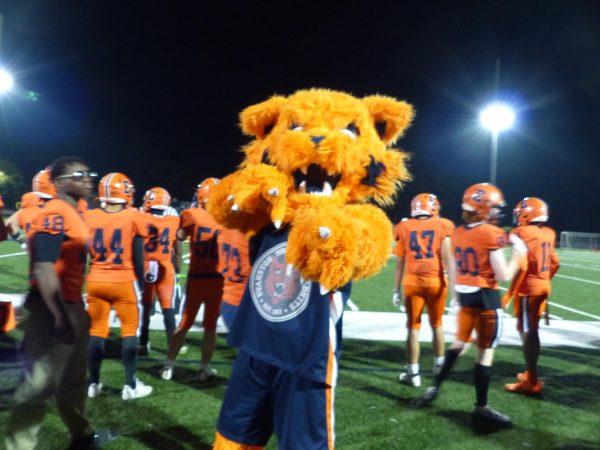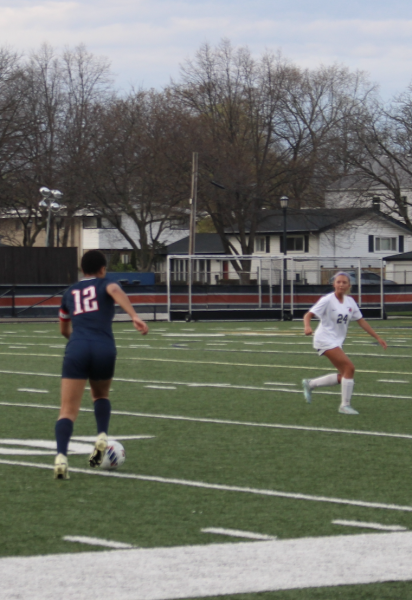Those not on the stat sheet deserve recognition
April 3, 2020
An often forgotten member of every ETHS varsity squad is the team manager, who does far more than sit and watch on their respective team; they spend countless hours ensuring the team has everything they need for success from putting air in balls to filming games and practices.
If the school, as we have known it, were still in session, spring sports would be just kicking it into full gear. Among others, the baseball, boys volleyball, girls soccer, lacrosse and softball teams would be playing some of their first games. While many of these sports differ mightily in play style, there is one thing that these teams have in common; they all have committed team managers who know the importance of their spot on the team.
“[Team managers] are definitely a part of our team dynamic. They help practices run smoothly and make sure all our balls and equipment are where they’re needed when they’re needed,” senior soccer player Sylvi Imrem said.
Senior boys varsity soccer player and girls soccer team manager Caden Ciesemier recognizes the potential impact he and other managers can have on their team.
“I feel that we help boost morale. I think having good morale is essential to success, and by being positive and helping out the team the best we can, we are positively impacting the team.”
Senior volleyball player Chyne Temple agrees with Ciesemier’s statement on a team manager’s impact.
“[Team managers] are important, we need someone to manage things to make sure everyone is organized. If there is no team manager everyone will wonder who will take on certain responsibilities.”
In addition to setting up equipment, a team manager can be found working on varying tasks during practices. A wrestling manager will analyze and distribute statistics or take attendance while a soccer manager will set up the drills, warm-up goalkeepers or shag balls and a volleyball manager will film a scrimmage and act as an extra player if needed. For each minute a team manager spends completing a small task, the athletes are allowed more time to practice and refine their game.
“The coaches need us to be there at every practice and be available to help them whenever they need us,” senior volleyball manager Hansley Bordes said. “They can’t do everything by themselves.”
While their contributions during practice are crucial to the athletes’ improvements, a manager’s duties come gameday directly influence the team’s ability to succeed. Tasks such as filming the game, tracking stats and making sure each player has the equipment they want or need is crucial to their success on the field.
“On game days, managers get players what they need like tape or water. They take care of little things so that we don’t have to move around as much and we can just focus on the game,” Temple explained.
Even the stats and game film collected during the game are essential. This data allows the players to identify areas of their play that need improvement or strengths that they need to use to their advantage.
Even with all the valuable contributions these individuals make for their respective teams, they are still undervalued and misunderstood by members inside and outside of the ETHS athletic community. Although it is important that a team manager has experience in the sports corresponding with the team they manage, a widely accepted fallacy is that someone will only become a team manager if they are not skilled enough to make the varsity squad. This misconception was quickly debunked by managers and athletes alike, who acknowledge that the position is more often filled by athletes of the opposite sex or those that love the sport but have lost touch with it in some way.
“This year I didn’t want to play, but I still wanted to take part in the team and help out,” junior Hailey Bates said. “I just love softball.”
Bates, one of three managers for the softball team, plays a crucial role by ensuring the athletes have everything they need to succeed on the diamond. If she does her job, the players can focus solely on their performance on the field.
Athletes realize that regardless of their importance, ETHS supporters tend to overlook team managers.
“They deserve more gratitude,” senior softball player Sydney Harrison said. “People are mostly there to see the players, and they tend to overlook the managers and other people that put in work behind the scenes.”
When also asked the question of why team managers tend to be overlooked, Imrem felt their anonymity is the cause of a lack of appreciation.
“They aren’t the names being announced on the field, and their names aren’t in the stats book. When we hear sports, we think athletes and people often forget all the other people that go into making any sports team great,” she said. “As far as gratitude, I hope they feel appreciated and know they’re doing a good job. If not, we should make that clear to them.”
There is more to team managers than the eye can see, they supply the needs of both the coaches and the athletes. Without them, there would be major dysfunctionality in every team environment. They are the missing piece to every team’s success. Even though they don’t compete, they work as hard as any player on the field, pool or court.
On behalf of the ETHS athletic community, thank you team managers!














